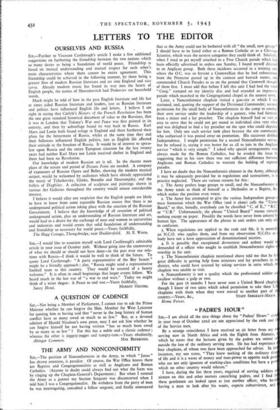THE ARMY AND NONCONFORMITY
SIR,—The position of Nonconformists in the Army, to which " Janus " has drawn attention, is peculiar. Of course, the War Office knows there are Baptists and Congregationalists as well as Anglicans and Roman Catholics. (Anyone in doubt could always find out what the form was by ringing up the Chaplain-General's Department.) But when I entered the Army as a gunner my Section Sergeant was disconcerted when I told him I was a Congregationalist. He withdrew from the party of men he was interrogating, consulted a fellow sergeant, and finally announced that as the Army could not be bothered with all "the small, new groups', I should have to be listed either as a Roman Catholic or as a Christian Scientist, which were the nearest categories they could think of. Similarly, when I tried to get myself attached to a Free Church parade which had been officially advertised in orders one Sunday, I found myself directed to an Anglican group. Both these incidents occurred in a training unit where the O.C. was so fervent a Cromwellian that he had exhortations from the Protector pasted up in the canteen and barrack rooms, and commended Church Parades to us on the ground that Cromwell thought of them first. I must add that before 1 left this unit I had had the word " Cong." stamped on my identity disc and had attended an impressive parade which marched to the Congregational chapel in the nearest town.
Later, a Nonconformist chaplain visited a gun-site at which I was stationed, and, quoting the support of the Divisional Commander, secured permission for the small body of Nonconformists in the camp to conduct their own service under the leadership of a gunner, who had formerly been a miner and a lay preacher. The chaplain himself had so vast an area to serve that he could not get round to individual sites very often and was delighted to find a lay preacher on the spot who could deputise for him. Only one such service took place because the site commander who authorised it was posted away on promotion. His successor disliked Independence. I sought permission for a second Nonconformist service, but he refused it, saying it was better for us all to join in the Anglican service " which is very simple." I asked why special arrangements were always made for the Roman Catholics, but he evaded the issue by suggesting that in his view there was not sufficient difference between Anglicans and Roman Catholics to warrant the holding of separate parades.
I have no doubt that the Nonconformist element in the Army, although it may be adequately provided for in regulations and instructions, is it practice neglected. There are various reasons for this:
t. The Army prefers large groups to small, and the Nonconformist in the Army tends to think of himself as a Methodist or a Baptist, &c., which makes the position even worse.
2. The Army has attempted to give the various Independent groups a mass formation which the War Office (and it alone) calls the " United Board," so that, broadly, everybody can be classified " C. of E.," " R.C." or " U.B." Unfortunately, the phrase " United Board " means virtually nothing except on paper. Possibly the words have never been uttered by human lips. The appearance of the phrase in unit orders can only add to confusion.
3. When regulations are applied to the rank and file, it is normally an N.C.O. who applies them, and from my observation N.C.O.s as body have not a keen appreciation of denominational niceties.
4. It is possible that exceptional devoutness and ardour would demanded of a officer who sought to establish Nonconformist rights worship in his unit.
5. The Nonconformist chaplain mentioned above told me that he ha great difficulty in getting help from ministers and lay preachers in th• district, who could have assisted by taking services in units which th chaplain was unable to visit.
6. Nonconformity is not a 'quality which the professional soldier c swallow without a gulp or two.
For the past 16 months I have never seen a United Board chaplai though I know of two units which asked permission to take their U. chaplains with them when they were moved to another part of


























 Previous page
Previous page